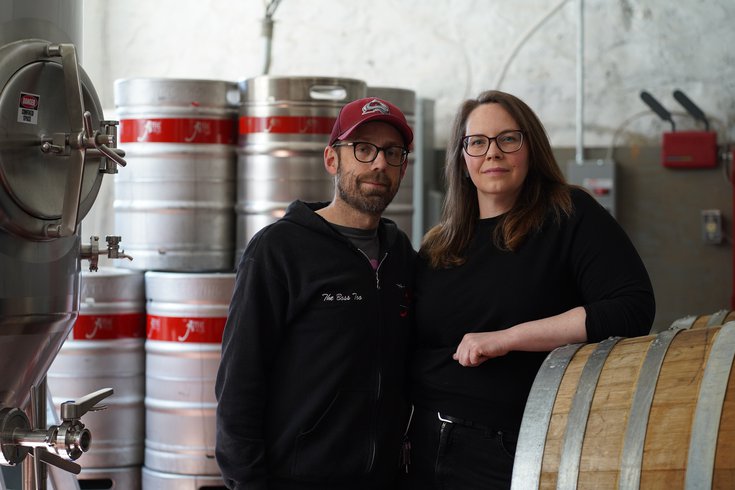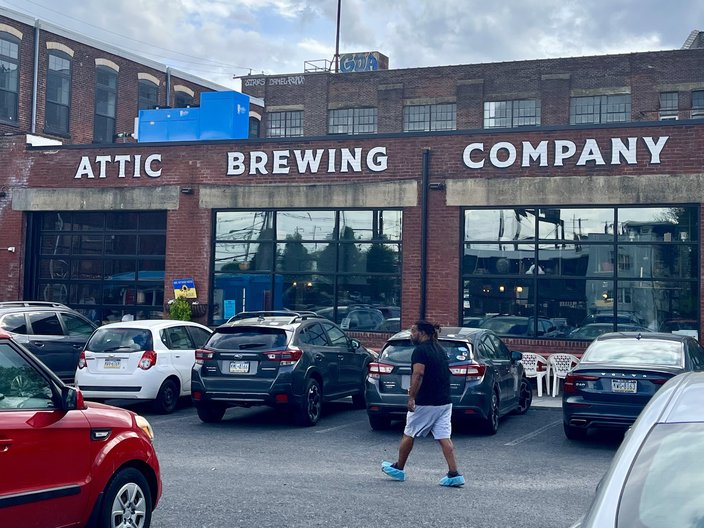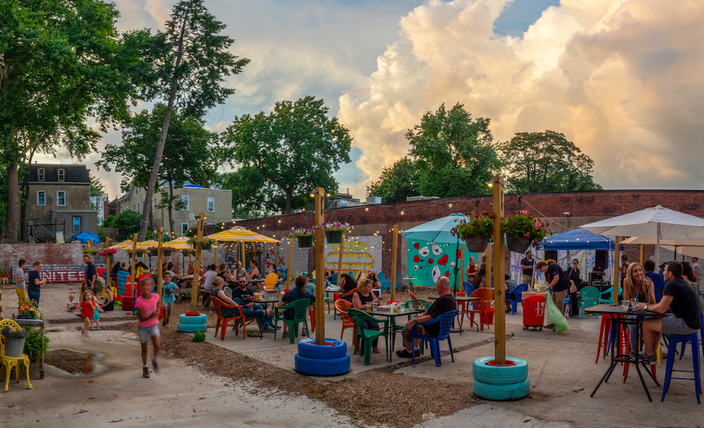
May 04, 2023
 Courtesy of/Attic Brewing Company
Courtesy of/Attic Brewing Company
Attic Brewing Co. in Germantown remained open throughout the COVID-19 pandemic, but owners Todd and Laura Lacy, above, now face financial uncertainty as they wait on pandemic relief from the IRS.
From an outside perspective, Attic Brewing Co. is successful and thriving, with crowds of beer lovers regularly packing its Germantown taproom and beer garden. Despite that scene, the craft brewery is one of many small businesses still struggling to emerge from the financial hardships caused by the COVID-19 pandemic.
First-time business owners Laura and Todd Lacy opened Attic Brewing Co. in a former pencil factory, at 137 W. Berkley St., in January 2020, just months before the coronavirus forced the world to shut down. Amid turbulent times, the brewery created award-winning beer, hosted live entertainment, donated to local causes and maintained its mission to employ Germantown residents.
Three years later, Attic is still feeling the financial strain. Namely, the business is waiting on returns from the Employee Retention Credit, a COVID-era program designed to encourage businesses to keep employees on their payrolls. The Lacys noted this struggle in an Instagram post in April, referencing the months-long process to get the money their business needs now.
"We're just really trying to make sure that our business continues to survive," Laura Lacy told PhillyVoice recently. "Although the pandemic is over, the additional debt that we've had to take on because we weren't eligible for other programs, that's all coming due.
"And then, you know, this inflation, higher costs. And our team that's been with us for 3 1/2 years, they're all looking to have increases in pay or additional benefits, which is all stuff that we want to continue to offer to attract employees and to retain our employees. And in order to do that, we just need the resources."
Run by the Internal Revenue Service, the ERC program offered refundable tax credits to businesses that continued paying employees while shut down or those that sustained significant revenue losses. Eligible employers could claim the tax credits on their original or adjusted tax returns for the time between March 13, 2020, and Dec. 31, 2021.
Laura Lacy started looking into the ERC last fall after learning about it from a fellow business owner and friend. Attic began the pandemic with 13 employees and grew to employ a many as 28 people as the public health emergency continued. The business never laid anyone off.
Attic Brewing Co., 137 Berkley St. in Germantown, is one of many small businesses still facing financial hardships in the aftermath of the COVID-19 pandemic.
"Most of our employees live in Germantown or the Mount Airy neighborhoods," Lacy said. "And we pay out over $400,000 in payroll annually, which is significant in a neighborhood that has some of the deepest poverty in the city of Philadelphia, all things that we're really proud of."
Lacy said she believed Attic would qualify for the ERC, but filing the paperwork proved complicated. So Attic hired the human resources services company ADP, which already handled its payroll, to complete its application. That process took eight weeks as ADP meticulously combed through the paperwork to ensure Attic filed correctly, Lacy said. She estimated that the IRS received the paperwork in late January or early February.
Lacy has reached out to other business owners who told her it had taken up to a year for them to receive their returns from the IRS.
"For us, we're just in a position with our business where the finances are extremely scary recently, you know," Lacy said. "We've had so much increase in costs to make the beer. All of the interest rates on all of our loans and credit cards have all gone up. We have tax bills that are due. So for us, we're just looking like, OK, where does the relief come from? We're in a position where a bank isn't working with us ... So, really, the lifeline that we have is through this employee retention tax credit."
That the entire ERC application process is done on paper further complicates the issue. The IRS is sending Attic a check for thousands of dollars through the mail, which worries Lacy because the post office in Germantown recently underwent a federal investigation due to mail delays and theft.
The IRS declined to comment on any individual cases. Spokesperson Eric Smith said the federal agency is working through the claims as quickly as possible, but issues with paper filings and fraudulent ERC claims have slowed the process.
"We have been working through a paper backlog as quickly as we can, and there's a lot involved with that," Smith said. "So I can't give you necessarily a timeline, but we're very aware that it's an important issue, and we're working through those claims as quickly as possible ... There's so many good, legitimate players. You want to pay those. But there's also a lot of scammers taking advantage of this provision."
Attic received federal loans totaling more than $100,000 from the Paycheck Protection Program, another COVID-era program, federal data shows. But the brewery was not approved for other COVID relief programs.
Specifically, Attic did not benefit from the Economic Injury Disaster Loan or the Restaurant Revitalization Fund, a pair of programs offered by the U.S. Small Business Administration, a federal agency dedicated to small businesses and entrepreneurs.
"For other breweries, similar size to mine, between the Restaurant Revitalization grants, and the EIDL loans, they got between $400,000 and $600,000 in pandemic assistance that we didn't get," Lacy said. "And so we're all trying to operate the same. But for us, we didn't receive any of that funding. And it's just extremely difficult."
EIDL is a loan program offered to small businesses in declared disaster areas that have suffered substantial economic losses. During the pandemic; a COVID-19 EIDL was created to help small businesses survive. The Restaurant Revitalization Fund provided emergency assistance for eligible restaurants, bars and other qualifying businesses impacted by the pandemic.
The SBA also declined to discuss the specifics of Attic Brewing's situation, but Christopher Hatch, communications director of SBA's Philadelphia regional office, acknowledged the overwhelming nature of the financial strain on small businesses in the United States during the pandemic. The SBA had to adapt to try help as many as possible, he said.
The agency was equipped to handle emergencies that impacted relatively small parts of the country, like natural disasters, but COVID wiped out small businesses nationwide.
"SBA was designed as a sprinkler system or watering system for small business 'farms,' the plants of small businesses," Hatch said. "Like your garden hose in your backyard that you use to water your plants helps them grow, helps them survive. And then things like the pandemic come along and we had to change gears. ...
"The pandemic was like a house fire and all of a sudden you are trying to put out a house fire with a garden hose, so we had to become that fire hose and it took time. But we helped millions of businesses get the financing they needed to survive; very proud of that. And, of course, there are some businesses did not get that help, and that's regrettable."
Applications for the COVID-era EIDL and Restaurant Revitalization Fund are now closed, but the SBA has programs still available to help businesses in need. Though many people only learned of the SBA due to its pandemic-era programs, the agency has been around for 70 years and continues to assist businesses in the post-pandemic age.
"We aren't just a pandemic relief agency; we are a federal agency that provides support to small businesses 24/7, 365," Hatch said. "That's through a variety of things, such as our loan programs, our training programs and our contracting programs."
Among the opportunities for financial assistance are 504 loans, 7(a) loans and microloans. General EIDL loans are still available for emergencies like flooding, earthquakes or hurricanes.
The Lacys have reviewed Attic Brewing's financial documents from last year and made changes they believe will ensure the business can operate in the post-pandemic climate.
These changes, outlined in an Instagram post last month, include bumping up happy hour to start at 4 p.m. and increasing beer prices in the taproom by 5% to 10%. Attic also is now charging a $5 cover when it hosts live music and performances to help cover artists' fees. The business has pulled back on its charity work and donations, too.
Lacy said she heard from U.S. Congressman Dwight Evans' office and state Rep. Darisha Parker after her Instagram post, which urged elected officials to prioritize the processing of ERC refunds. They inquired about Attic's situation and connected the Lacys with resources to keep the brewery afloat.
Beer lovers can support Attic by purchasing gift cards and beer, which the brewery will ship anywhere in Pennsylvania, Lacy said. She also encouraged patrons to spread the word about the brewery and to visit its taproom and beer garden, now a staple of the Germantown community.
Attic Brewing Co. in Germantown has an outdoor beer garden located just behind its taproom.
"We're in what would be considered more of a blighted neighborhood," Lacy said. "And we've definitely built out this beautiful neighborhood spot ... We have the beautiful taproom and then a huge outdoor beer garden, which became like a community oasis during the pandemic, a safe place for people to go.
"But, you know, this is the first business I've ever owned. And so I take full responsibility that I'm going through my own learning lessons, but the pandemic was something that even seasoned business owners haven't been able to weather. So we're just really trying to make sure that our business continues to survive."
Follow Franki & PhillyVoice on Twitter: @wordsbyfranki
| @thePhillyVoice
Like us on Facebook: PhillyVoice
Have a news tip? Let us know.
 Jon Tuleya/PhillyVoice
Jon Tuleya/PhillyVoice Todd Lacy/Attic Brewing Company
Todd Lacy/Attic Brewing Company